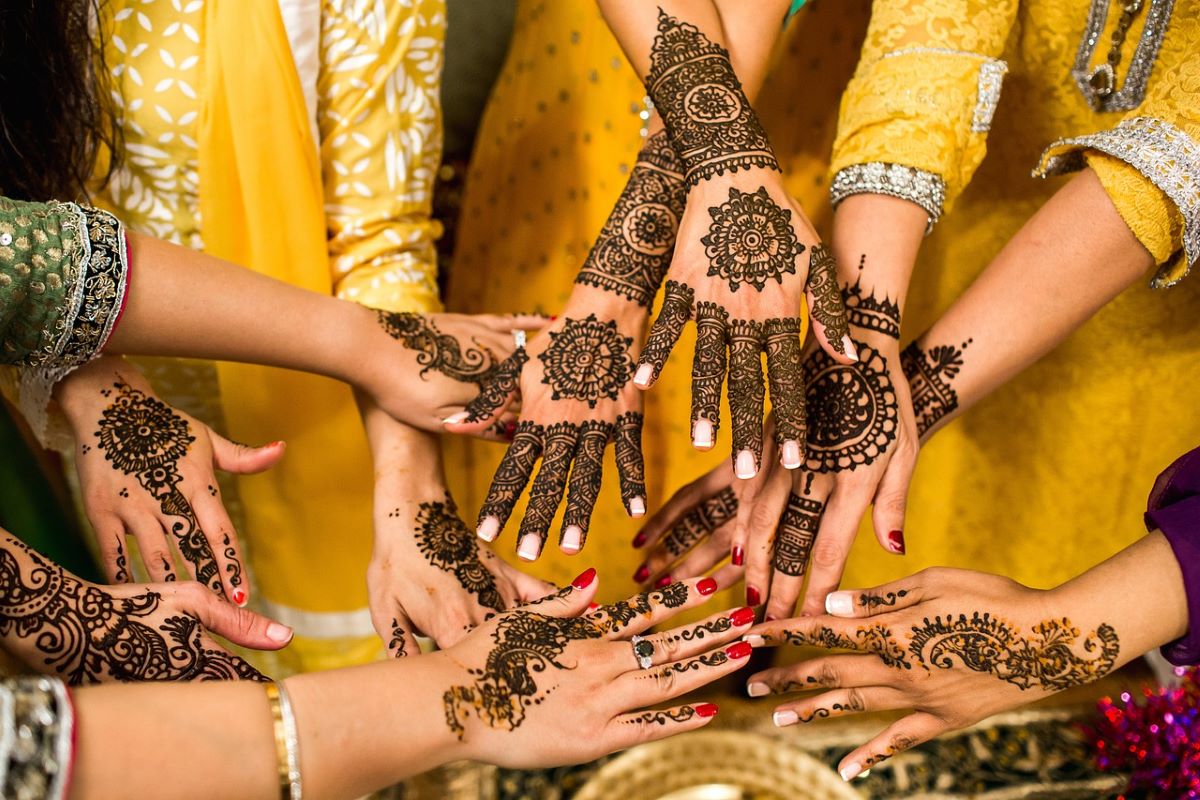Regular tattooing is becoming more popular, with more and more people getting inked. However, not all are keen to have a permanent tattoo and want to try out a potential tattoo design first to see if they like it.
With a henna tattoo, that is possible since a henna tattoo is not permanent. However, how long does the henna tattoo last?
Henna tattoos generally last for about two weeks, fading away slowly as the skin renews. You can extend the life of your tattoo by keeping the Henna paste on for as long as possible. You can also tattoo areas with thicker skin and protect them with lotion or natural oils. Avoid shaving the area as it exfoliates the skin.
This article discusses henna tattoos and how to apply them. We also discuss how long they stay on the skin after application and how you can extend the henna tattoo, so they don’t fade away too quickly.
What Is Henna Tattoo?
Henna tattoo is a body art originating from India but widely practiced in sub-continental India and the Middle East. It involves drawing intricate designs on body parts using a natural ink called henna. The ink is not permanent and washes away after some time. Henna tattoos may have a religious significance or just as art.
Henna tattoo is a form of Indian body art. It may also be called Mehndi or Henna, depending on where you are. In the henna tattoo, patterns were drawn on the person’s body, using a natural ink from the henna plant. This plant grows naturally in North Africa and India. The Middle East also has henna plants.
Temporary tattoos may be similar to henna tattoos in many ways. One is that they wear off after some time. Henna tattoos are also recognizable since the patterns are usually very recognizable. It tends to have strong Middle Eastern and Indian motives and can be rather intricate.
Henna tattoos may carry a spiritual connection, particularly with Hinduism. Henna tattoos may represent a person’s “inner and outer” sun, symbolizing the changes in a person after a particular religious experience.
However, henna tattoos can also be enjoyed strictly as an art. In fact, many appreciate henna for its aesthetic beauty.
Some enjoy henna tattoos as they regard it as a mentally relaxing exercise. Seeing a henna artist applying the design to their body helps them to relax. Henna artists usually have a series of designs to choose from, or you can allow the artist to draw a custom design for you.
Why Do People Wear Henna Tattoos?
Henna tattoos could be applied for various reasons, such as during religious festivals. Some also wear henna tattoos after undergoing some religious experience. People also wear henna tattoos during weddings and birthdays. Henna tattoos also could be worn for aesthetic purposes without a specific reason.
Henna tattoos are traditionally worn during special occasions, such as weddings or celebrations, such as Diwali. In Hindu and Sikh weddings or festivals, women often have henna tattoos on their hands, feet, palm, and upper backs.
It is common to see men wearing a henna tattoo, but usually on their arms, legs, back, and chest. A henna tattoo is worn during Muslim celebrations as well.
In events like these, the Henna tattoo symbolizes good health and future blessing and prosperity to whoever wears it, be it the groom, bride, or the person celebrated. At weddings, it is common to have very dark henna, as darker henna means deeper love.
Henna tattoos could also be worn to signify a person has undergone a religious experience. Some henna tattoos could signify a person’s “inner and outer sun’.
However, as the culture of the Henna tattoo spreads worldwide, it is also worn for aesthetic reasons, without any meaning behind it.
Some people love the intricate designs of a henna tattoo and prefer it over conventional tattoos that are permanent. Some may also relate henna tattoos as more artistic and beautiful.
What Are The Types Of Henna Tattoo Ink?
There are two types of henna tattoo ink, brown henna ink, and black henna ink. Both are made from the henna plant and have the same brown color base. The only difference is that some chemicals, such as paraphenylenediamine (PPD), are added to black henna ink. Some people may develop allergic reactions to PPD.
Henna ink is a genuine ink derived from the henna plant (Lawsonia inermis). It is made by harvesting the leaves from the plant and drying them under the sun until they are crisp like paper. The leaves are then blended into powder and used when needed.
Natural henna ink is made by mixing the henna powder with lemon juice, stirring it until it forms the consistency of a mashed potato. It is then applied to the skin.
If you are to purchase henna tattoo ink, you may encounter two types of them in the market. Brown or black henna tattoo. They are essentially similar but have some minor preferences.
Brown Henna Ink
Brown henna ink is the most natural type of henna ink, made completely by mixing henna leaf powder with lemon juice into a thick consistency to be applied to the skin.
Black Henna Ink
Black henna ink takes the brown henna and adds some chemicals to make the ink black. The most commonly added chemical is paraphenylenediamine (PPD).
PPD is added for several reasons. One is to darken the color of the henna tattoo. The second is to help extend the henna tattoo’s duration, making it last longer on your skin.
However, before proceeding with the black henna ink, test a small amount of it on your skin first. This is because people can be allergic to PPD, and once it is applied to your skin, you may experience skin burns in worst-case scenarios.
How To Apply A Henna Tattoo?
Henna tattoos are usually applied by henna artists, although you can do it yourself. Henna paste is made by mixing henna powder, lemon juice, and water until it forms a thick paste. The paste is then added to a henna pen. The artist will squeeze the pen, and the paste is then applied to the skin, similar to piping icing to cakes.
You can apply henna tattoo yourself, although people commonly have a Henna artist do the work since they make better designs.
Henna artists usually start by making the henna and mixing the henna powder with lemon juice to make a thick paste. They then scoop up the henna paste into a cone, similar to the icing pipe used in cake making. The cone’s end usually has a small hole where the henna paste can exit.
The Henna artist then cleans the skin area to prepare it. Once cleaned and dried, the application begins. If you visit a henna artist, you can either select a design from their collection or have a custom design drawn for you.
Depending on your occasion or requests, your henna artist may draw some unique designs for you.
After about 15-20 minutes, the henna ink paste may start to dry, crack and fade. To manage this, your henna artist may mix up some lemon juice with sugar and then apply it to the henna design to keep it moist.
More modern henna artists also switch to using wraps or bandages such as Saniderm. They may also apply some natural oils, such as sesame or coconut oil, before wrapping to help keep the henna design moist.
How Long Do Henna Tattoos Last?
Henna tattoos usually last for about 1-2 weeks before fading away. How long your henna tattoo lasts may depend on things such as how long you keep the paste on your skin, if you shave or exfoliate your skin, and the quality of your henna ink paste. You can implement certain steps to help keep your henna tattoo longer.
In general, henna tattoos tend to last around 1-2 weeks with general care. A henna tattoo is applied to your skin surface, with its coloring ingredient bonding with the keratin on your skin.
This means when your skin renews, the dead skin will fall off, together with the henna tattoo. Since the new skin does not have any henna tattoo ink applied to it, it will not carry any ink. This makes henna tattoos different from regular tattoos.
Many reasons may influence the result of your henna tattoo staying on your skin:
How Long You Keep The Paste On Your Skin
During the application of the henna ink paste on your skin, the color pigment from the henna starts to ‘stain’ your skin. The more time you are able to keep the henna paste on your skin, the darker and deeper the henna ink may be on your skin.
However, henna ink paste usually dries, cracks, and starts to peel off in 15-20 minutes, which means additional steps need to be taken to keep the paste moist.
Common practice involves applying some natural oil, such as sesame, coconut, or olive oil, on the henna design, before wrapping it with wrappers.
If you can keep the henna paste moist and on your skin for as long as possible, you will likely get a longer-lasting henna tattoo.
This means leaving the henna paste on your skin for at least 12-24 hours, and you must resist the temptation to scratch, or wash the paste away.
If you Take Care Of Your Skin After Applying Henna Tattoo
Once you have removed your henna paste, you should have nice brown henna patterns on your skin. Your skincare regime will not determine how long the henna tattoo stays on your skin.
You should aim to keep the skin surface moist and supple, as it will delay the shedding of old skin. This means applying natural oils such as olive, sesame, or even corn oil to the henna tattoo.
Applying the skin area with natural oils also protects it from water during your showers or if you go swimming.
Finally, avoiding shaving or scrubbing the skin would be best. This is because if you do any of that, you exfoliate the skin, which means you are actually actively removing the skin. If you remove your skin, you will also remove some of the henna tattoos.
Quality Of Your Henna Ink Paste
Obviously, if you are using high-quality henna ink paste, your henna tattoo should last longer. In general, high-quality henna tattoo ink is usually made with 100% henna plant and does not contain any fillers.
Cheaper, lower-quality henna powder may have fillers added to it to bulk the powder and increase its weight. Still, it may not give the best results, since these fillers may not have the pigment to colorize your skin.
You may also look at using black henna ink, which leaves a darker design, and may last longer.
However, since it contains chemicals that may cause allergic reactions in some people, it may be best to test and apply it at a small section of your skin first to avoid causing damage to your skin.
Are Henna Tattoos Safe?
Henna is safe for most people. This is because henna tattoo ink is 100% natural and does not use chemicals. When shopping for henna ink, check the ingredients to ensure no chemicals are added. At the same time, try out the ink on a small area of your skin to ensure you do not have an allergic reaction to henna.
For most people, henna is likely safe to use on their skin. This is because henna ink is derived from natural plants, and the ingredient used to make a henna paste is also natural.
However, henna tattoo ink has chemicals added to it, such as black henna ink. This means when you shop for henna tattoo ink, you want to check and ensure that there are only natural ingredients on the product label.
Usually, natural henna tattoo ink should have only three things: henna powder, water, and natural acids. Henna powder provides the base, while water helps the henna paste to adhere to your skin better.
Natural acids help to draw out the coloring properties of henna. These natural acids may be lemon juice, lime juice, or vinegar.
If you are getting black henna ink because you want a darker ink result, ensure to first test the ink on a small part of your skin before applying it in full. This is because black henna ink has added chemicals, which means you may be allergic to them.
In fact, if you have never applied any henna before, you should still take preventive measures. You should apply some henna to your skin, even if it is a natural henna ink. This is because people can be allergic to the weirdest things, including henna.
Can You Remove Henna Tattoo?
You cannot instantly remove a henna tattoo. However, you can speed up its fading process. You can apply lemon or lime juice with some baking powder on the skin or soak it in salt water. You can also exfoliate your skin using a facial scrubber or silicone-based makeup remover to remove the henna tattoo.
In general, you cannot instantly remove a henna tattoo. This is because the henna tattoo ink is embedded in your skin, which means if you want to remove the tattoo, you will also need to remove your skin.
Unless you are willing to scrub on your skin so hard that it bleeds and all, you may not immediately remove the ink. However, you can speed up the fading process of the henna tattoo by using the following options.
Citrus Juice and Baking Soda
Citrus juices such as lemon are known to be good skin-lightening agents, which may help to fade your henna ink faster.
Mix up half a cup of warm water with a full tablespoon of baking soda and two teaspoons of lime or lemon juice. Please apply it to the skin and let it soak into your skin before removing it.
Soak Skin In Salt Water
Soaking your skin in salty water helps to encourage your dead, older skin to exfoliate and help new ones grow. This will help to lighten your henna ink.
Fill up about a half-full bathtub of warm water, and then put about half a cup of salt into warm water. Soak for up to 20-30 minutes.
Olive Oil And Salt
Salt is known as a good natural exfoliating agent, and olive oil is a good skin moisturizer. Mix them together, and you get to remove dead skin, lighten your henna tattoo, and moisturize your skin at the same time.
Mix one cup of olive oil with four tablespoons of sea salt. Coat your skin with the mix, and let it stay on the skin for 10-15 minutes before rubbing it off with a wet towel.
Exfoliate Skin With Scrubber
You can help remove old or dead skin with the henna ink faster if you exfoliate it directly with the right face or body wash. These face of body washes usually contain exfoliating agents, such as volcanic mud, coffee, or brown sugar.
Be sure to not exfoliate too rigorously or frequently to avoid irritating the skin. Also, consider applying moisturizer after exfoliating to re-moisturize your skin.
Micellar Water
Micellar water is not your regular water. It is essentially soft water with tiny balls of cleansing oil molecules called Micelles. It is commonly used to clean makeup but can also help fade tattoo water.
 Being Human
Being Human





